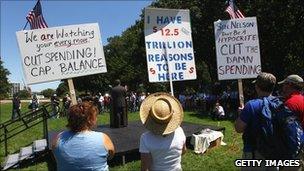US debt deal winners and losers
- Published
- comments

Many Tea Party activists will not be happy unless all their demands are met
It is nearly over. Although we are still waiting for the Senate to vote it seems Washington has narrowly averted turning a domestic drama into a world crisis.
But it could be a pivotal moment in American politics. Who are the winners and losers? The leader of Democrats in the House, Nancy Pelosi gave the game away when she agreed that one of the quotes of the day, that the deal was "a Satan sandwich". "With Satan fries on the side,", external added the former speaker.
Winners and losers: you could nominate the American economy for either category, depending on your politics; Vice-President Joe Biden and Senate Republican leader Mitch McConnell as winners for actually doing the deal; Mitt Romney as a loser for shamelessness in condemning it,, external but my choices are more obvious.
The loser: The president
It could be worse for Barack Obama. But not by much. If America had defaulted on its debt he would be a marked man. That has not happened.
But he loses in two ways. First the policy. Let's be quite clear about this - the only victories for Mr Obama are the bullets he has managed to dodge. He has been forced to accept deep cuts which run counter to all his plans and which his party hates. Remember he would have liked a second stimulus plan. Instead, he has been made to swallow spending cuts which undermine his attempt to transform America.
The second way he loses is that he has not looked like a leader., external
He has made a big play to seem to be the only grown-up in the room, the sensible compromiser. That may appeal to the centre, but it is hardly hope and change. He has not grabbed this issue and wrestled it into a shape pleasing to his supporters. OK, it is hard to know how he could have done that.
But that is what makes great leaders great, they spot possibilities that elude the rest of us. The one chink of light for Mr Obama is that he has kept tax rises on the table for the future. But that is hardly a strategy.
In 2012 he can, of course, contrast what the Republicans have done now, with what he would like to do. But that only really works if you think the policies of his first two years have been judged an outstanding success.
The winner: The Tea Party
Any other movement would be crowing victory from the rooftops. They seized on a vote that had become as routine and uncontroversial as putting the cat out, and crafted it into a crisis. They used it to push their main demand to the top of America's political agenda. And they have won the deep cuts to government spending that they wanted.
But the Tea Party is more than just fiscal conservatism, even if it is far short of the madness its enemies claim. It is a movement of people so consumed with the righteousness of their cause, like the mirror image of 1960s radicals, that they are convinced betrayal is inevitable.
To the fiscally pure, 99% of what they want is as bad as a fat zero and a kick in the butt. Only the Tea Party could claim that this deal is a strategic masterstroke by Mr Obama, as Redstate does., external
They may want to feel like hunted underdogs but it is clear to the rest of us that the Tea Party is not a freakish aberration of the angry but a power that can win elections and change the policy of a country. The way it has done this has reinforced its image, good and ill.
Its detractors will say this episode proves its irresponsibility and willingness to drive the country to the brink of disaster to get its way. Supporters will glory that rebel souls have proven the worth of making a stand and holding true to a cause. And more centrist Republicans will hide their guilty secret from sight.